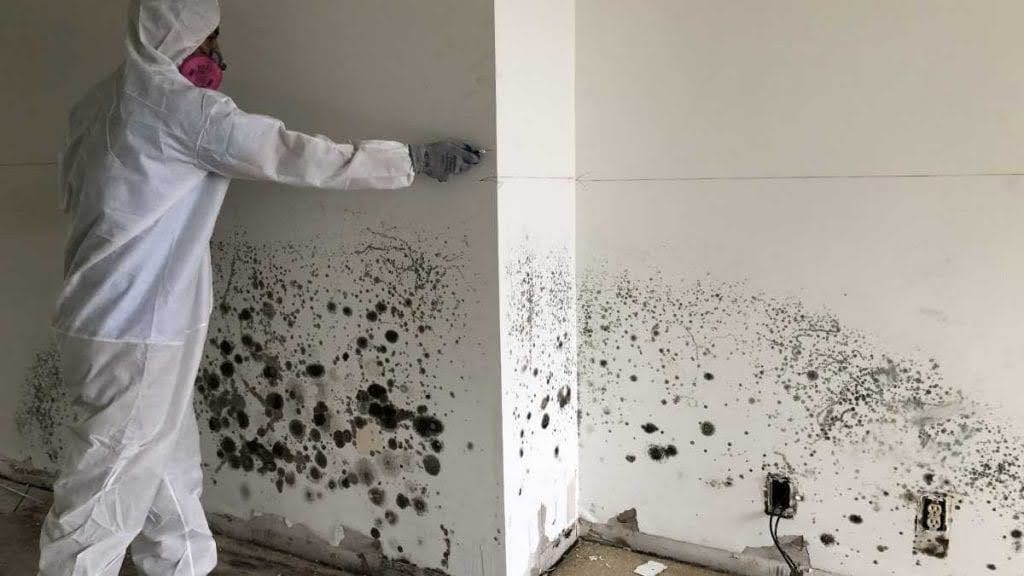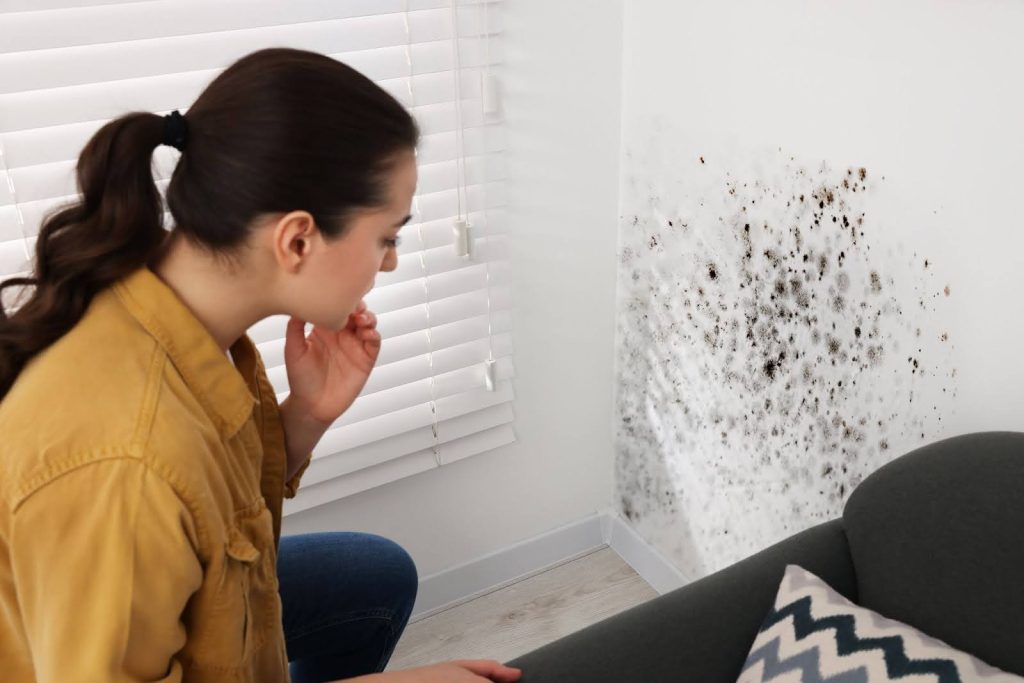Dealing with mold in your home is stressful, and the thought of staying there while remediation is underway can add to the anxiety. Mold poses health risks and disrupts your daily life, making it crucial to understand: can you stay in home during mold remediation?
In this article, we will discuss whether it’s safe to stay in your home during mold remediation. We’ll explore the factors determining whether remaining in your home is advisable and highlight safety measures. By the end, you’ll understand what steps to take and when to consider temporary relocation.

Can You Stay in Home During Mold Remediation?
The decision to stay in your home during mold remediation depends on several factors, including the extent of the mold problem, the location of the affected areas, and the remediation methods being used. In many cases, we advise you to vacate the premises to ensure your safety and allow for a more thorough cleaning process.
For small, localized mold issues, it may be possible to remain in your home if the affected area can be properly contained and isolated. For extensive or toxic mold infestations, temporary relocation is often advised to reduce exposure to harmful spores and remediation chemicals.
But when is it safe to stay in a house during mold remediation? The decision should be made in consultation with mold remediation professionals like ours at Mold Remediation Atlanta. We can assess the specific circumstances of your situation and provide guidance on whether staying in the home is safe.
Factors to Consider
Severity of mold infestation
The extent of mold growth is crucial in determining whether it’s safe to remain in your home during remediation. A minor infestation, such as a small patch in a bathroom corner, may allow for continued occupancy as long as proper precautions are taken.
However, major infestations, like extensive mold growth in walls or HVAC systems, often require evacuation. These larger problems might present higher health risks and typically involve more invasive remediation methods, which can release significant amounts of mold spores into the air.
Location of mold
The area affected by mold significantly influences whether you can remain in your home during remediation. You may not need to leave if mold is confined to a seldom-used space. Yet, temporary relocation is often necessary if it has spread to common areas.
Mold in essential living spaces, such as bedrooms, kitchens, or living rooms, almost always requires evacuation. These areas are frequently used, which increases the risk of exposure and makes it difficult to avoid the ongoing remediation work.

Health conditions of occupants
Vulnerable populations, such as children, older adults, and immunocompromised individuals, should avoid staying in a home during mold remediation. These groups are particularly susceptible to the harmful effects of mold exposure.
Similarly, people with pre-existing respiratory conditions or allergies should consider relocating during the process. Even minimal exposure to mold spores or the chemicals used in remediation might worsen their symptoms and overall health.
Exposure to mold spores
During remediation, the disturbance of mold colonies might increase the number of airborne spores. This elevated concentration of spores might pose health risks, even to individuals who weren’t previously affected by the mold.
Exposure symptoms may include respiratory issues, allergic reactions, and, in some cases, more severe health problems. The risk is particularly high during the active phases of remediation when mold is being removed or treated.
Chemical exposure
Mold remediation typically uses powerful chemicals and cleaners to kill and eliminate mold. While effective, these substances might irritate the eyes, skin, and respiratory system, particularly in confined spaces.
Prolonged exposure to these chemicals may result in headaches, dizziness, and other side effects, even when proper ventilation is in place. Moreover, the lingering odors and fumes might be unpleasant and potentially harmful, underscoring the importance of taking precautions during remediation.
Disruption and inconvenience
Remediation work can be noisy and disruptive, with machinery running and workers moving through the affected areas. This constant activity often makes it difficult to maintain normal daily routines, especially if you’re working from home or caring for family members.
Additionally, access to certain parts of your home may be restricted during the process, which can be particularly challenging if essential areas like kitchens or bathrooms are impacted. In such cases, staying in the home comfortably and safely may become impractical.
Safety Measures If Staying in the Home
Containment of affected areas
Proper containment is essential if you stay in your home during mold remediation. To prevent mold spores from spreading to clean areas, use heavy-duty plastic sheeting to create barriers around the affected spaces, sealing off doorways and vents. This containment ensures that mold contamination stays isolated.
In addition, maintaining adequate ventilation within the contained area is key. Negative air pressure machines are typically used for this purpose. These devices filter and expel the air outside, ensuring that any contaminated air remains confined and doesn’t escape into the rest of the home. This method helps protect the clean areas while effectively managing air quality during remediation.
Protective equipment
When entering or passing near the remediation area, always wear the appropriate protective gear. This includes a properly fitted N95 respirator mask, gloves, and protective eyewear to minimize exposure to mold spores and remediation chemicals.
At the same time, we advise you to keep children and pets well away from the work areas. You can set up temporary barriers or secure the area with locks to prevent accidental entry. Since children and pets may not fully understand the risks involved, these precautions are necessary to protect them from potential hazards.
Monitoring air quality
To ensure a healthy living environment during mold remediation, invest in high-quality air purifiers equipped with HEPA filters for the areas you will be occupying. These purifiers are highly effective at capturing airborne mold spores, helping improve your home’s overall air quality.
Additionally, we recommend conducting regular air quality checks throughout the remediation process. You can use professional testing services or home air quality monitors to assess whether mold spores and other contaminants in your living spaces are maintained at safe levels. This continuous monitoring helps ensure that the air remains clean and safe for you and your family.
When to Consider Temporary Relocation
Temporary relocation should be considered when your home is unsafe, uninhabitable, or undergoing significant repairs. This can happen due to natural disasters, major renovations, or health hazards like mold. During such times, finding alternative housing is crucial for your safety and comfort. Depending on the situation, options for temporary housing may include:
- Staying with friends or family.
- Booking a hotel.
- Even exploring short-term rental options like furnished apartments.
The goal is to ensure that you have a safe and comfortable place to stay until your primary home is ready for you to return.

Conclusion
Can you stay in your home during mold remediation? This depends on several factors, including the severity of the infestation, the location of the affected areas, and the specific remediation methods used. If you face a mold problem, it’s essential to consult experts, such as our team at Mold Remediation Atlanta, to help assess your unique situation and safely guide you through the process.
While smaller, localized mold issues may allow for continued occupancy, more extensive infestations or those affecting critical living spaces typically require temporary relocation to ensure your safety. Health risks, exposure to remediation chemicals, and disruptions to daily life are all key considerations.
That said, our professional expertise and proven methods ensure that your home is thoroughly treated, allowing you to make informed decisions confidently. Trust Mold Remediation Atlanta to prioritize your well-being and restore the safety of your living environment!


